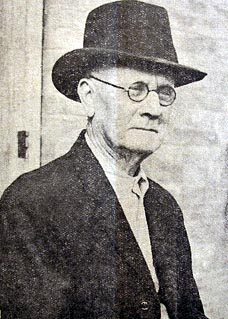
Malakoff In Earlier Days; Its Mode of
Illumination and How It Got Its Name
by Britt Thompson
from The Malakoff News
Friday, April 5, 1928
The overland mail, the famed pony express
of the early days of
Those were the “good old days,”
according to some of the early pioneers who had to store their
drinking water in unsanitary cisterns and do their hauling with
slothful ox teams, but none of them would even think of wanting
to go back to hardships of that period of

George B.
Thompson
One of the best known of the pioneer
citizens who helped to build Malakoff is George Thompson who was
born near here in 1860. At this time, he is recognized as
the oldest merchant in
“I remember well in my boyhood days
of the old tallow candles that were made in the homes and burned
just for a short while in the evenings,” he said. “This
was in the early days of oil lamps and not everyone was bold
enough to trust their homes and lives to the vagaries of these
flaming contraptions that had a habit of exploding every once in
a while. Of course, at that time, not everyone knew that
the chances of oil lamps exploding were remote if they were kept
filled and clean.”
“Now, fortunately, we are over those
days, for we get our illumination and our electric power from a
state-wide organization that has made it possible for us to get
the same character of service that great cities enjoy.”
Mr. Thompson recalled that about 20 years
ago, Sam Hall established an electric light plant here. He
had about 20 customers and operated his service for about one
year. This plant went out of business, unfortunately, and
the town had to go back to oil lamps for its illumination.
The town was without electric service
until the Texas Power and Light Company came here in 1925 with
its powerful high line service, giving Malakoff unlimited
electric power for lighting, cooking, refrigeration and industry.
Mr. Thompson recalled also the manner in
which Malakoff received its name, which long has remained a
mystery to many townsfolk.
“It seems,” he said, “that
after the pony express was serving the community here for some
time, the citizens who resided nearby petitioned the government
for use of the name of Mitcham, in honor of one of the old
pioneers here. This was refused because of the similarity
of the name with another post office address. The post
office department suggested the name of Malakoff. This was
a Russian name and marked an important town in the famous Crimean
War. This was adopted and was used until 1881 when the
Texas & St. Louis railway, a narrow-gauged road, was run into
Malakoff. The railroad people wanted to do honor to some
one of the big officials of the company and endeavored to change
the name of Malakoff to Purdon.”
“This idea didn’t set so well
with the citizens here because they had already become well-known
through the name of Malakoff, so the post office authorities were
again petitioned and permission to retain the old name was
granted.”
Malakoff recently gained nationwide
recognition when it was announced that the now famous Malakoff
lignite mine was employed to furnish its entire output of a
trainload of lignite a day to the Trinidad generating station of
the Texas Power and Light company. This mine, experts declare, is
capable of giving lignite for generations to come.
CONTRIBUTE TO THE LOOKING BACK COLUMN
IN THE MALAKOFF NEWS! - If you have photographs, articles, or
family histories that you would like to see in the Looking Back
column, please contact Britt Thompson at the following email
address: rbtnyu81@aol.com or mail to Britt Thompson,
A Note from Britt: I look
forward to being at the Sesquicentennial Celebration and
Cornbread Festival on Saturday 2005. Please bring your old
photographs, newspapers, yearbooks, etc. I would love to
share memories of Malakoff with those who are there and gain
information for future Looking Back columns.
Back To Henderson County TXGenWeb
This site is owned and maintained by Bunny Freeman Content of this site has been gathered from many sources and transcribed records. Therefore, errors may occur. When in doubt as to the accuracy of data contained herein, go to the actual records yourself. If you find any inaccurate data, please let us know. The information contained in this website is for your personal use only. All pages, compilations, transcriptions and abstracts are protected by copyright law and may not be published in whole or in part without written consent of the author, contributor and/or webmaster.
© Copyright 2002 2003 2004 2005 Bunny Freeman & Holli Kees